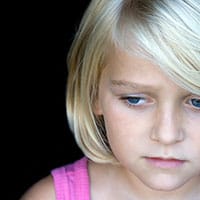Preschool depression is the term mental health professionals use to describe symptoms of major depression that appear in children younger than 6. At one point, there was considerable doubt among these professionals that such a condition truly existed. However, evidence gathered in the last several years strongly supports its reality. According to a study published in 2010 in the journal Current Directions in Psychological Science, the presence of depression symptoms in a preschool-age child significantly increases that child’s chances of having diagnosable major depression during later childhood and in adolescence.
Major Depression Basics
Major depression is the most common popular term for a mental health condition called major depressive disorder. Mental health professionals and the general public also sometimes refer to this disorder as clinical depression, or simply as depression. Adults affected by major depression can develop a range of debilitating symptoms, including such things as intensely sad or hopeless mental states, intensely guilt-ridden mental states, emotional outbursts, unpredictable crying spells, aching muscles, fatigue, headaches, unusual appetite alterations, unusual sleep alterations, a reduced or absent ability to feel pleasure, a confused or indecisive mental state, and memory problems. Clinically depressed adults may also become fixated on death or suicide-related thoughts or actions.
Depression in Older Children and Teens
At one time, most mental health experts believed that depression-like symptoms in children between the ages of 6 and 12 did not indicate the presence of true major depression. Instead, according to then-current theories, these symptoms were just part of a temporary developmental phase of childhood. Today, experts in the field widely acknowledge the reality of major depression in children in this age group. The National Institute of Mental Health lists potential outward signs of depression in children that include sulking, periods of irritability or negativity, behavioral or disciplinary problems in school and communication problems with parents or other adults. Teen depression resembles adult depression in some respects, but also differs significantly. Potential indications of depression in a teenager include rapid changes in outlook or personal appearance, a loss of interest in school, truancy, disruptive classroom behavior, and involvement in self-harming behaviors like “cutting.” Depressed teens also often have other mental health problems such as eating disorders or anxiety disorders. The presence of major depression in late childhood or adolescence increases an individual’s chances of developing depression during adulthood.
Preschool Depression
Prior to 2009, most studies on childhood depression focused on children between the ages of 6 and 12. The studies that did focus on depression in preschool children generally concluded that the phenomenon did not exist. However, expert opinion on this subject has recently begun to change. For instance, in a study published in 2009 in the American Medical Association’s Archives of General Psychiatry, a team of researchers from the Washington University School of Medicine concluded that depression in preschool-age children is real and meets the officially established criteria for making a depression diagnosis. A second study from the same research team, published in 2010 in Current Directions in Psychological Science, concluded that mental health experts had overlooked preschool depression in the past because they lacked the tools to recognize the disorder and did not realize that the outward signs of preschool depression can look quite different from the outward signs of depression in older children, teens, or adults. For example, depressed preschool children often don’t engage in disruptive behaviors, and also sometimes experience depression-free periods on any given day, even when they’re in the middle of a bout of depression.
Long-Term Effects
The authors of the study published in Current Directions in Psychological Science concluded that, when compared to other children, children affected by preschool depression have increased risks for developing depression in later childhood or adolescence. In some cases, bouts of depression in preschool-age children may actually represent the first appearance of a chronic form of depression that continues into later childhood or adolescence. Since depression in older children or teenagers can lead to depression in adulthood, preschool depression may sometimes be the first stage in a lifelong struggle with depressive illness.
Considerations
The authors of the study published in Current Directions in Psychological Science note that preschool-age children affected by depression may be especially responsive to depression treatment. This is true because of the highly changeable or “plastic” state of the brain during this phase of life. Potential future treatment options for depressed preschoolers include a training technique called psychosocial education and a form of psychotherapy called Parent Child Interaction Therapy—Emotion Development (PCIT-ED).

